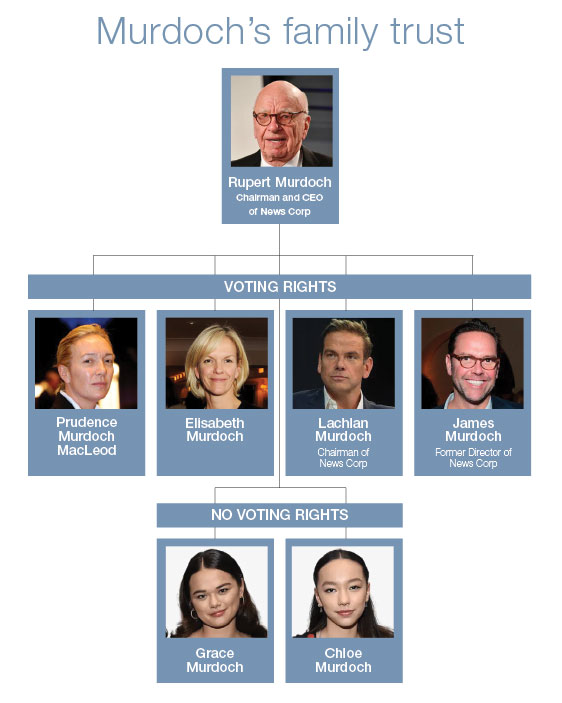Few succession sagas have been watched as closely as the Murdoch family’s. For decades, speculation has surrounded billionaire Rupert Murdoch’s succession, the business magnate who built a single Australian newspaper into a global media empire, News Corp. After dominating the conservative media landscape and exerting considerable influence over politics, journalism, and entertainment for over seven decades, 93-year-old Rupert is now attempting to amend an irrevocable trust in court.
The developments in this case may have HBO’s Succession writers reaching for their notepads. In a recent New York Times article, we all but sit inside the Nevada courtroom in which the Murdoch family unpacked their legal fight in September 2024. The trial recordings totalled over 3,000 pages, revealing private communications between the siblings about their father’s death, secret family lunches, and family call logs.

Our unique vantage point at Creaghan McConnell Gould allows us to recognize that regardless of if, when, and how the dust settles for the Murdochs, this complex cautionary tale demonstrates how important trust and communication are for a business family. The lack of both has left the Murdoch family divided and unable to resolve their conflicts without significant legal interventions.
How did this succession plan go so sideways? In 2023, Rupert officially stepped down as Chairman of Fox Corp and News Corp and passed on his positions to Lachlan, who is now the sole Chair of News Corp and both CEO and Executive Chair of Fox. Now, Rupert wants to ensure these succession decisions are upheld after his death. However, two major obstacles stand in his way: the irrevocable trust and three of his children.

The Murdoch family trust
The irrevocable trust was established in 1998 during Rupert’s divorce from his second wife, Anna Maria Torv. She was concerned about potential succession conflicts down the road, and wanted to ensure the future legacy of their three children, Elisabeth, Lachlan, and James, and her stepdaughter, Prudence, Rupert’s daughter from his first marriage. As part of their settlement agreement — in what now seems like a quick, band-aid solution — Rupert created an irrevocable trust.
Anna may have prophesized the future. In October 2023, Rupert filed a proposed amendment to this trust: When he died, he wanted voting control of the trust to pass solely to Lachlan, his chosen heir, instead of all four of his oldest children. The move surprised everyone, notably Elisabeth, James, and Prudence. Their father’s efforts to remove their equal control from a fixed trust have now united them in fighting back against him and Lachlan.
Lachlan vs. Prudence, James, and Elisabeth
When Rupert and Lachlan first introduced their plan to change the trust to the other family members at a special emergency trust meeting in 2023, Rupert stated:
“I love each of my children, and my support of Lachlan is not intended to suggest otherwise. But these companies need a designated leader and Lachlan is that leader.”
But when it comes to family business, we’ve seen time and time again that love and seemingly good intentions aren’t enough. Rupert and Lachlan planned to change the family trust to secure Lachlan’s leadership, citing concerns over decision paralysis and a potential shift away from their conservative media stance. They feared that Prudence, Elisabeth, and James may unite against Lachlan after Rupert’s death, and may seek to sell Fox News.
Lachlan was also concerned about the interference of his leadership from his siblings. After failing to garner Elisabeth’s support before embarking on the mission to amend the trust, Lachlan felt the threat looming. By the design of the trust, Rupert would take his votes with him when he passed, and all of the decisions made regarding the trust would require a majority vote from the siblings’ four managing directors.
Rupert may have failed to do the math when he granted four of his children voting power because there was no contingency plan if votes fell short of a majority, resulting in a 2-2 vote. Lachlan knew that if his siblings — notably James — wanted to block his leadership and break the business’s back, James would only need to convince one of his sisters. The three siblings deny any coordinated effort to change leadership or sell the company, as per the New York Times.
Taking it to court
Rupert’s ‘Plan A’ of buying out his children failed. He had gone as far as plotting strategic moves, including offering Chloe and Grace (his two youngest children) voting rights within the family trust, giving them an unprecedented degree of power within the trust. Rupert then moved to ‘Plan B’, kicking off “Project Family Harmony,” the plan to amend the family trust. Though the trust was designed to be irrevocable, it did contain one provision: Rupert has the right to make changes to the trust if he can prove he’s acting in the best interests of all its beneficiaries.
Per the recent Times article, “Project Family Harmony” would work as follows:
“An amendment would be added to the trust, allowing Rupert to create two new trustees — Cruden 2 and Cruden 3 — that would share responsibility for managing the trust alongside the original trustee, Cruden. Rupert’s representatives would control Cruden 2. Lachlan’s representatives would control Cruden 3. After Rupert’s death, Cruden 2 would pass to Lachlan’s representatives. At that point, he would have control of both Cruden 2 and Cruden 3 and could outvote the original Cruden every time, rendering his siblings powerless. Thus would a democratic family trust built on the principle of equal governance be transformed into a monarchy.”
The trial, which was closed to the public, aimed to determine if Rupert and Lachlan were acting in good faith and for the sole benefit of the trust’s heirs. In December 2024, Nevada Commissioner Edmund J. Gorman Jr. ruled against them, calling the move a “carefully crafted charade” designed to favour Lachlan at the expense of his siblings. The court found the change would not benefit all heirs, likely not resulting in any familial harmony at all, and making it invalid under the trust’s rules.
Prudence, Elisabeth, and James made a joint statement following the ruling: “We welcome Commissioner Gorman’s decision and hope that we can move beyond this litigation to focus on strengthening and rebuilding relationships among all family members.”
Rupert and Lachlan, however, don’t plan on giving up and are reported to be planning their appeal. There is still a long road ahead for the Murdoch family and “Project Family Harmony”, as the decision now moves forward to the probate court, where Commissioner Gorman’s ruling serves as a recommendation to a district judge. Following that, the losing party can then challenge the judge’s determination. It appears this battle has only just begun.
Impacts of succession turmoil outside the family
While the escalating trust conflict continues to set the Murdochs back, it also has far-reaching consequences for the business, the media industry, and the global community. One of News Corp’s substantial shareholders, hedge fund Starboard Value, has pushed to eliminate News Corp’s dual-class share structure, which gives the family disproportionate voting power (41%) despite only holding 14% of the company.
Proposals to eliminate the dual-class share structure at News Corp have been put forth in the past, but this call directly references the destabilizing effects of the succession battle: “The transition from Rupert to his children has let complicated family dynamics and different opinions about News Corp and Fox Corp impact the company’s stability,” writes Jeffrey Smith, a managing member at Starboard. Since this single trust controls 41% of the voting power, any change can significantly impact shareholder value.
Succession planning and trusts
There are several different directions the Murdoch family succession saga may take next. As Rupert and Lachlan prepare their appeal and the case moves forward to its next round of battle in the Probate Court, the options remain for any combination of buyouts, sales, or entirely new deals altogether. The situation could grow even more complicated if the legal proceedings outlast the 93-year-old patriarch. Time will tell as the divided family presses forward in their separate factions.
The Murdoch family trust expires in 2030, currently holding the shares together. After the expiration of the trust, Rupert’s children would be free to sell their shares to non-family members. At that point, it’s possible that News Corp could be run by not a single Murdoch at all, let alone Lachlan. Ahead of the court hearings, Rupert himself requested an independent report to assess how succession-related conflict had affected other family businesses.
Kate McConnell, a Principal at Creaghan McConnell Gould, offers a few insights of her own regarding the Murdoch family’s ongoing challenges:
- Many families share similar experiences. Family challenges are often deeply personal and private, particularly in the UHNW sphere. What makes them even more complex is the uncertainty around who to lean on, as many firms don’t specialize in offering holistic support to families. Acknowledging that these challenges are both valid and widely shared is the first step toward opening the door to meaningful support. The Murdoch family’s story illustrates that even the most powerful business families aren’t immune to interfamilial challenges that could’ve been remedied long before the family went to court.
- You can’t contract good behaviour. Governance structures, trusts, and shareholder agreements protect assets and relationships, but they don’t build alignment on their own. Good governance mitigates power imbalances and creates opportunities for building alignment, conflict resolution, and shared purpose. While Rupert Murdoch leaned heavily on documented structure and control, neither of those sustained alignment within his family.
- Create space for co-design. Succession isn’t about the leading gen dictating the “rules of the game” for the rising gen. It’s about inviting the rising gen to co-design and collaborate around the rules of the game, so they feel engaged and prepared rather than simply told what to do. In Rupert Murdoch’s case, he created a plan and unleashed it upon his children rather than co-designing it with them.
The Murdoch family’s trust dispute demonstrates the repercussions of unresolved succession planning. A lack of clarity about what the future would look like left all of Rupert’s children feeling uncertain and destabilized even before the current conflict arose. Rupert fostered a family environment that encouraged competition and rivalry between his children all their lives and kept them uncertain about their roles in the family and the business.
Now, this attempted overhaul of their long-established family trust has deepened the distrust and division in a family already struggling to maintain functional relationships with one another. Rupert’s late-stage move to favour one heir over the others and centralize power with him has damaged relationships across the board. Unwilling to be disenfranchised by their father’s alienation, the siblings are entangled in a power struggle that will continue to cost them all significantly in money, time, relationships, and legacy.
Questions to consider:
- Is your family willing and able to discuss familial challenges, and do all members of your family know where to turn to for support?
- Are your governance tools supporting alignment within the family, or are they being used as a replacement?
- How many opportunities do you — the rising gen — have to contribute to the rules of the game?
Further reading:

